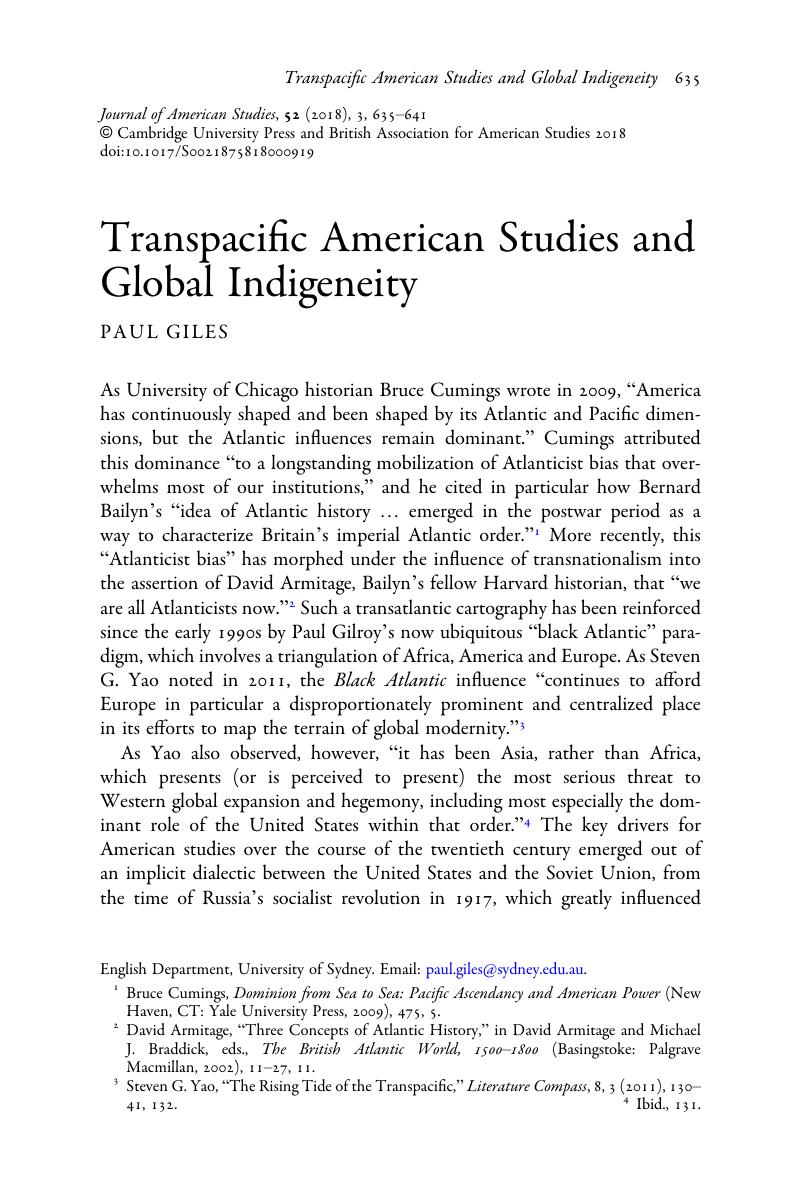No CrossRef data available.
Published online by Cambridge University Press: 03 August 2018

1 Cumings, Bruce, Dominion from Sea to Sea: Pacific Ascendancy and American Power (New Haven, CT: Yale University Press, 2009)Google Scholar, 475, 5.
2 Armitage, David, “Three Concepts of Atlantic History,” in Armitage, David and Braddick, Michael J., eds., The British Atlantic World, 1500–1800 (Basingstoke: Palgrave Macmillan, 2002), 11–27Google Scholar, 11.
3 Yao, Steven G., “The Rising Tide of the Transpacific,” Literature Compass, 8, 3 (2011), 130–41Google Scholar, 132.
4 Ibid., 131.
5 Bertrand, Kenneth J., “Geographical Exploration by the United States,” in Friis, Herman R., ed., The Pacific Basin: A History of Its Geographical Exploration (New York: American Geographical Society, 1967), 256–91Google Scholar, 256, 262.
6 See, for instance, Sae-Saue, Jayson Gonzales, Southwest Asia: The Transpacific Geographies of Chicana/o Literature (New Brunswick, NJ: Rutgers University Press, 2016)Google Scholar.
7 Eperjesi, John R., The Imperialist Imaginary: Visions of Asia and the Pacific in American Culture (Hanover, NH: Dartmouth College Press, 2005), 14Google Scholar.
8 Lyons, Paul, American Pacifism: Oceania in the U.S. Imagination (New York: Routledge, 2005), 8–9Google Scholar, 10, 148.
9 Ibid., 27, 31.
10 Eperjesi, John, “The American Asiatic Association and the Imperialist Imaginary of the American Pacific,” boundary 2, 28, 1 (2001), 195–219CrossRefGoogle Scholar, 219.
11 Thomas, Nicholas, Islanders: The Pacific in the Age of Empire (New Haven, CT: Yale University Press, 2010)Google Scholar, 2.
12 Hau‘ofa, Epeli, “Our Sea of Islands,” in Waddell, Eric, Naidu, Vijay and Hau‘ofa, Epeli, eds., A New Oceania: Rediscovering Our Sea of Islands (Suva: School of Social and Economic Development, The University of the South Pacific, 1993), 2–16Google Scholar.
13 Blum, Hester, “The Prospect of Oceanic Studies,” PMLA, 125, 3 (May 2010), 670–77CrossRefGoogle Scholar, 670.
14 Chen, Kuan-Hsing, Asia as Method: Toward Deimperialization (Durham, NC: Duke University Press, 2010), 186CrossRefGoogle Scholar.
15 See, for example, Allen, Chadwick, Trans-Indigenous: Methodologies for Global Native Literary Studies (Minneapolis: University of Minnesota Press, 2012)CrossRefGoogle Scholar; and Somerville, Alice Te Punga, Once Were Pacific: Māori Connections to Oceania (Minneapolis: University of Minnesota Press, 2012)CrossRefGoogle Scholar.
16 Wilson, Rob, Reimaging the American Pacific: From South Pacific to Bamboo Ridge and Beyond (Durham, NC: Duke University Press, 2000)Google Scholar, 163, 219.
17 Adam Garfinkle, “The Decade Ahead,” in “The 9/11 Decade: How Everything Changed,” US Studies Centre, University of Sydney, 7 June 2011.
18 Chakrabarty, Dipesh, Provincializing Europe: Postcolonial Thought and Historical Difference (Princeton, NJ: Princeton University Press, 2000), 3Google Scholar.
19 Kratochvíl, Petr and Doležal, Tomáš, The European Union and the Catholic Church: Political Theology and European Integration (Basingstoke: Palgrave Macmillan, 2015), 4CrossRefGoogle Scholar.
20 On the “Fordist” economy see Harvey, David, The Condition of Postmodernity: An Enquiry into the Origins of Cultural Change (Oxford: Blackwell, 1989), 284Google Scholar.
21 On Obama's manipulation of “multiple and contradictory American fantasies” see Pease, Donald E., The New American Exceptionalism (Minneapolis: University of Minnesota Press, 2009), 13–19Google Scholar, 209.
22 Damrosch, David, “How American Is World Literature?”, The Comparatist, 33 (May 2009), 13CrossRefGoogle Scholar.